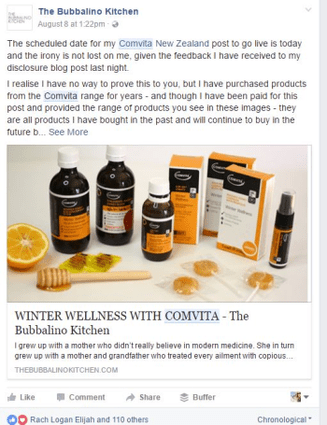By Brooke Hurndell
Image: S.M.A.G. 2.0
Just when advertisers and PR agencies thought they had cracked the enigma of connecting with millennials in a way that poses very few costs to the company, people have caught on.
The marketing methodology behind using influential bloggers and social media users, known as influencers, to promote products and businesses has brought into question whether the lines of ethics and transparency are being overstepped and it's easy to see why.
An article in the Sunday Star Times last week has sparked debate around the issues associated with influencers being used by agencies to push commercial products via social media platforms and blog posts.
The power of influencers
In some categories it's been shown that "marketing-induced consumer-to-consumer word of mouth generates more than twice the sales of paid advertising" according to research from consultancy firm McKinsey & Company.
On a macro scale, the most common use of social influencers sees top athletes such as Serena Williams plugging Nike through her social media channels. But let's talk micro level. Bloggers and opinion leaders who are well-known for their niche areas of knowledge, for example, beauty bloggers, foodies, DIY geniuses and fashionistas.
They're predominantly followed by everyday people who take a specific interest in their friendly tips advising us of the latest trends and shortcuts that make our lives better. Or perhaps, boost our lifestyles to look just as good as their Instagram posts.
These bloggers establish a relationship with their followers and consequently their words of wisdom inspire actions to be taken. Actions such as testing out the cough medicine their favourite blogger recommended as a 'miracle worker' for their children. We trust the opinions of experts whom we perceive to be authentic.
B2B organisations are also getting in on the action. Social media is awash with B2B influencers you want on your side. By identifying, then establishing relationships with the influential thought leaders and authority figures in an industry, businesses are able to amplify their message.
Influencers have the ability to cut through the noise and put your message in front of the audiences you want to reach.
The marketing methodology behind using influential bloggers and social media users, known as influencers, to promote products and businesses has brought into question whether the lines of ethics and transparency are being overstepped and it's easy to see why.
An article in the Sunday Star Times last week has sparked debate around the issues associated with influencers being used by agencies to push commercial products via social media platforms and blog posts.
The power of influencers
In some categories it's been shown that "marketing-induced consumer-to-consumer word of mouth generates more than twice the sales of paid advertising" according to research from consultancy firm McKinsey & Company.
On a macro scale, the most common use of social influencers sees top athletes such as Serena Williams plugging Nike through her social media channels. But let's talk micro level. Bloggers and opinion leaders who are well-known for their niche areas of knowledge, for example, beauty bloggers, foodies, DIY geniuses and fashionistas.
They're predominantly followed by everyday people who take a specific interest in their friendly tips advising us of the latest trends and shortcuts that make our lives better. Or perhaps, boost our lifestyles to look just as good as their Instagram posts.
These bloggers establish a relationship with their followers and consequently their words of wisdom inspire actions to be taken. Actions such as testing out the cough medicine their favourite blogger recommended as a 'miracle worker' for their children. We trust the opinions of experts whom we perceive to be authentic.
B2B organisations are also getting in on the action. Social media is awash with B2B influencers you want on your side. By identifying, then establishing relationships with the influential thought leaders and authority figures in an industry, businesses are able to amplify their message.
Influencers have the ability to cut through the noise and put your message in front of the audiences you want to reach.
Transparency a must with influencers
Influencers are lauded as holding the key to connecting with fickle millennials, whom many perceive as being notoriously tricky to engage with.
But what happens when your audience cottons on to the fact you've paid influencers to plug your business in their posts?
That's what's happening now and influencer campaigns are starting to face difficult questions from a sceptical public that doesn't want to feel deceived.
So what's the solution?
Transparency. Influencers need to be candid about why they are plugging a product because audiences demand openness and honesty.
We are currently living in what's being called 'the age of authenticity'. The only way to establish meaningful relationships with your audiences is to be honest.
Despite the need for openness, laws around full disclosure for social influencers promoting a product or business are somewhat ambiguous – at least compared to the likes of the UK.
So while you may not be bound to full disclosure, it's advisable that organisations that go down the influencer route are transparent in their communication.
Influencers are lauded as holding the key to connecting with fickle millennials, whom many perceive as being notoriously tricky to engage with.
But what happens when your audience cottons on to the fact you've paid influencers to plug your business in their posts?
That's what's happening now and influencer campaigns are starting to face difficult questions from a sceptical public that doesn't want to feel deceived.
So what's the solution?
Transparency. Influencers need to be candid about why they are plugging a product because audiences demand openness and honesty.
We are currently living in what's being called 'the age of authenticity'. The only way to establish meaningful relationships with your audiences is to be honest.
Despite the need for openness, laws around full disclosure for social influencers promoting a product or business are somewhat ambiguous – at least compared to the likes of the UK.
So while you may not be bound to full disclosure, it's advisable that organisations that go down the influencer route are transparent in their communication.


